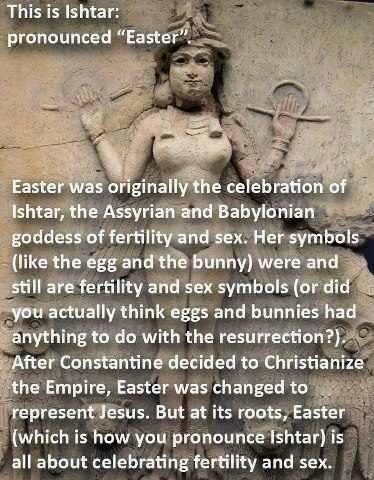Let's set the record straight on this nonsense.
 |
| Taken from the The Richard Dawkins Foundation for Reason and Science Facebook Page |
Easter has nothing to do with Ishtar. This is called a etymological homonym fallacy, meaning that just because two different words sound similar or identical in a given language does not necessarily mean they are related in meaning, nor do they necessarily come from the same source. A lot of words do come from similar original sources in Greek or Latin, but this is not always the case.
For instance, the word "bow." This word has several definitions, but let's look at two of them. One definition came mean something like to bend a knee in reverence, as in I bow before the King. This comes from the Old Norse word buga, which meant 'to bend.' Then there is the bow as in a string bow, like a crossbow string or a bowstring of a violin. That word is derived from an Old English word boga which means 'arch.' Then there is the bow of a ship, which largely comes from a Germanic word meaning should. Same word which comes from completely different languages from words that have completely different meanings. Just because they happen to sound similar is modern English does mean necessarily that they evolved from the same word.
The Christian celebration of the Resurrection of Jesus is based on the Jewish festival of Passover (as it always falls on the Sunday following Passover). Most Christians do not even use a cognate of "Easter" except in languages of a Germanic origin, wherein Easter evolved from the word that means "shining/east," that is, dawn or sunrise. Hence an Easter morning "sunrise service" at your local church. Everyone else, all over the world, still calls it Passover or Pascha.
Easter eggs likewise come from Judaism not Assyria. In the Passover Seder for instance, cooked eggs are a symbol of Jewish mourning at having to live in slavery in Egypt, or like Mary Magdalene by Christ's tomb or the Blessed Mother who was weeping at the foot of the cross, which is how it came to be associated as a Christian symbol. They were first colored in early Christian art, going back centuries.
The Easter Bunny is a purely German thing. There is some artwork from the Middle Ages where Mary is depicted as a hare, but it didn't get picked up so much as an Easter symbol until Lutherans and Catholics started using hares as a symbol for the Virgin Mary in the latter part of the Seventeenth Century.
And don't even get me started on that historical inaccuracy as Constantine wanting to "Christianize" the Roman Empire. Constantine legalized Christianity and near the end made gave it "most favored religion" status in the Empire. Constantine was not baptized until his deathbed. Christians were celebrating Easter since pretty much the first century. They may not have called it Easter, as that is a latter Germanic word (see above).
The first major controversy that had a real chance of breaking up the Church in the early Church period was called the Quartodeciman Controversy. It was a very heated debate on when the Church should celebrate Easter. In a nutshell, people were arguing about whether the Feast of the Resurrection should fall on Passover (which moves around on the day of the week like Christmas) or the Sunday after Passover as a mixed date. This seems a bizarre thing to tear the Church apart over, but in the midst of crises over the validity of sacraments, it was the in thing to argue over at the time. But, suffice is to say that what we now call Easter was so central to Christians that people were willing to fight over when to have. This in itself disproves the assertion that Easter is some Christian rip off of Ishtar, an obscure Assyrian god that was not worshiped in Greco-Roman religion, except maybe a few secret religious cults, or even arguably known about in most quarters, and was not even largely still believed even in Mesopotamia after Alexander the Great's conquest.
Comments